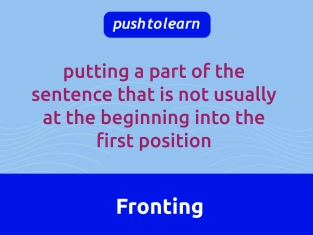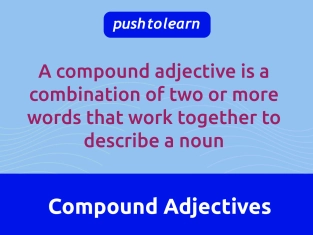by PushtoLearn
Focus Adverbs: Only, Just, Even
Table of Contents
Focus Adverbs: Only, Just, Even Exercise and Quiz
These exercises focus on Focus Adverbs: Only, Just, Even
What Are Focus Adverbs?
Focus adverbs emphasize specific words or ideas in a sentence. They change the meaning of the sentence depending on where they are placed. For example:
-
I only eat vegetables (nothing else).
-
I eat only vegetables (emphasizing the specific food).

Focus Adverb: Only
Only limits the meaning of a sentence by specifying one person, thing, or action. Its position can change what part of the sentence is emphasized.
Rules for Using "Only"
-
Before the subject: Focuses on the person or thing.
-
Example: Only Maria passed the test. (No one else passed.)
-
Before the verb: Focuses on the action.
-
Example: Maria only studied. (She didn’t do other activities.)
-
Before an object or prepositional phrase: Focuses on the specific object.
-
Example: Maria studied only math. (She didn’t study other subjects.)
Focus Adverb: Just
Just is used to show something happened a short time ago or to emphasize simplicity, fairness, or exactness.
Rules for Using "Just"
-
To mean “a short time ago”:
-
Example: I just finished my homework. (A few minutes ago.)
-
To mean “only”:
-
Example: It’s just a cold. (Not something serious.)
-
To emphasize fairness or exactness:
-
Example: I want just one piece of cake. (Exactly one piece, no more.)
Focus Adverb: Even
Even is used to show surprise or something unexpected.
Rules for Using "Even"
-
To emphasize surprising information:
-
Example: She even brought her dog to the office. (This is unusual or unexpected.)
-
To intensify a comparison:
-
Example: This book is even better than the last one.
-
To stress extremes:
-
Example: He didn’t even say goodbye. (This shows how surprising or disappointing his behavior was.)
Common Errors with Focus Adverbs
-
Incorrect placement:
-
Only I like ice cream vs. I only like ice cream.
-
In the first sentence, only I like ice cream. In the second, I like only ice cream (not other desserts).
-
Confusing “just” and “only”:
-
I just arrived (short time ago) vs. I only arrived (nothing else happened).
-
Misusing “even”:
-
Saying Even I don’t like this when you mean I don’t even like this.
Everyday Use of Focus Adverbs
|
Adverb |
Example Sentence |
Meaning |
|
Only |
She only eats fruit. |
She doesn’t eat anything else. |
|
Just |
I just called you. |
I called a moment ago. |
|
Even |
Even the teacher didn’t know the answer. |
The teacher not knowing is surprising. |
FAQ
Where do I put "only" in a sentence?
Place "only" right before the word or phrase you want to emphasize.
How is "just" different from "only"?
"Just" can mean recently or simply, while "only" means nothing more than.
Can I use "even" in negative sentences?
Yes, even works well in negative sentences to show surprise, e.g., He didn’t even try.
What’s the most common mistake with focus adverbs?
Incorrect word placement, which changes the meaning of a sentence.
Can I use more than one focus adverb in a sentence?
Yes, but it may sound awkward. For example: I just only wanted a snack. Use one to keep it clear.

